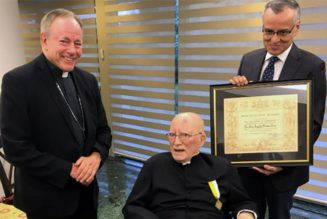ROME – In what’s being hailed as a demonstration that Pope Francis is in earnest about empowering women within ecclesiastical structures, on Friday, for the first time ever, the pontiff named a woman as the Promoter of Justice for the Appeals Court of the Vatican City State.
In effect, the Promoter of Justice functions like a District Attorney in the United States, making the case for a criminal charge in front of the justices of the Vatican tribunal whenever a conviction comes up for appeal.
Francis tapped Catia Summaria for the role, which runs for five years. Summaria, who hails from Bari in the southern Italian region of Puglia, previously served as a substitute Procurator General for the Appeals Court of Rome and has a long history of involvement in labor law issues. (That’s especially important, since one of the functions of the appeals court is to hear cases arising from the Vatican’s labor office.)
The move is consistent with new rules for the Vatican legal system decreed by Pope Francis last year, which gives preference to university professors and veteran jurists in appointing judges and magistrates, on the theory that they already have their own careers and incomes, meaning they’re not Vatican lifers, and thus ought to be more independent.
Francis has also named Sister Nathalie Becquart as one of two under-secretaries for the Synod of Bishops, which is also a first, but it may well be that Summaria’s new role is the more challenging one.
It’s certainly not mere tokenism, as the Vatican’s criminal justice system is becoming progressively more significant in the Pope Francis era. Whether Summaria, who’ll turn 74 in March, ends up regarding it as an honor or a headache, however, remains to be seen.
Historically, the Vatican’s Court of Appeals was a fairly sleepy outfit, handling only a few cases a year and with most of its judges doing double duty on the Roman Rota, the Vatican’s main ecclesiastical court, the majority of whose work is processing annulment cases. St. John Paul II abolished the requirement that the president of the Court of Appeals also be the dean of the Rota, and that its judges also be Rota judges, in 1987.
In recent years, the Vatican’s criminal courts have become more active, including high-profile prosecutions for financial offenses. Immediately, Summaria will inherit an appeal filed by former Vatican bank president Angelo Caloia over his recent conviction in a fraud scheme involving selling bank properties at below-market rates and skimming the balance off the top.
Caloia is the most senior Vatican official ever to be convicted of a crime in a Vatican court, so his appeal and that of former Vatican bank lawyer Gabriele Liuzzo will be closely watched.
It’s also possible that, sooner or later, appeals of convictions arising from the controversial $200 million London land deal which, so far, has cost five Vatican employees their jobs and, indirectly, may have played a role in the downfall of Italian Cardinal Angelo Becciu, will end up in Summaria’s lap.
The Court of Appeals is likely to be even busier in light of a new law governing the awarding of Vatican contracts issued by Pope Francis last June, intended to centralize the procurement process and thereby achieve economies of scale, as well as to inject transparency and objectivity into the process. As part of that new system, the pontiff assigned responsibility for adjudicating disputes to the tribunal of the Vatican City State with the possibility of appeal to the Court of Appeals.
Given that there are hundreds of potential contractors out there who may be affected by the new system as it takes shape, the possibilities for disputes seem enormous and the resulting workload for the two courts may be correspondingly greater.
The most significant headache facing Summaria and her colleagues in the Vatican legal system, however, may be – indeed, almost certainly is – as much political as a matter a strict jurisprudence.
To date, all the high-profile Vatican criminal trials have featured either laity as the principal defendants – including Caloia and Liuzzo in the Vatican bank case; Giuseppe Profiti, former president of Bambino Gesù, the papally-sponsored pediatric hospital in Rome, accused of illicitly using funds to remodel the apartment of Italian Cardinal Tarcisio Bertone; and Francesca Chaouqui, convicted in the original Vatileaks case – or minor clergy, such as Monsignor Lucio Angel Vallejo Balda, also convicted as part of the Vatileaks investigation.
So far, no bishop has yet been indicted or convicted of any criminal offense, leading some to suspect a calculated design to offer up laity or low-ranking clergy as the fall guys while insulating more senior figures from culpability. The Profiti case is considered emblematic, in that direct beneficiary of the maneuver for which he was convicted, Bertone, wasn’t even called as a witness, let alone named in the indictment.
Yet virtually all the crimes for which these laity and junior clergy have been convicted had to be reviewed and approved by the higher-ups. In most systems, if a crime occurs on an executive’s watch, that executive is considered responsible, either by virtue of direct complicity or at least due to negligent oversight.
At some stage, if the reforms instituted by Pope Francis are to be deemed truly credible, there will have to be a prosecution of a senior figure in the ecclesiastical power structure. When and if that happens, it will be extraordinarily sensitive, placing massive pressure on the lawyers and judges involved to get it right.
To be sure, Summaria is hardly the first person to be appointed to a Vatican position which, in retrospect, ends up seeming an impossible gig, or at least one you wouldn’t wish on your worst enemy.
She is, however, one of the few women ever given such an assignment, and perhaps that’s the ultimate sign of seriousness about women’s empowerment Pope Francis could deliver – offering a woman not simply the same rank and privileges as the men in the system, but the same potential frustration and heartache too.
Follow John Allen on Twitter at @JohnLAllenJr.
Join Our Telegram Group : Salvation & Prosperity











